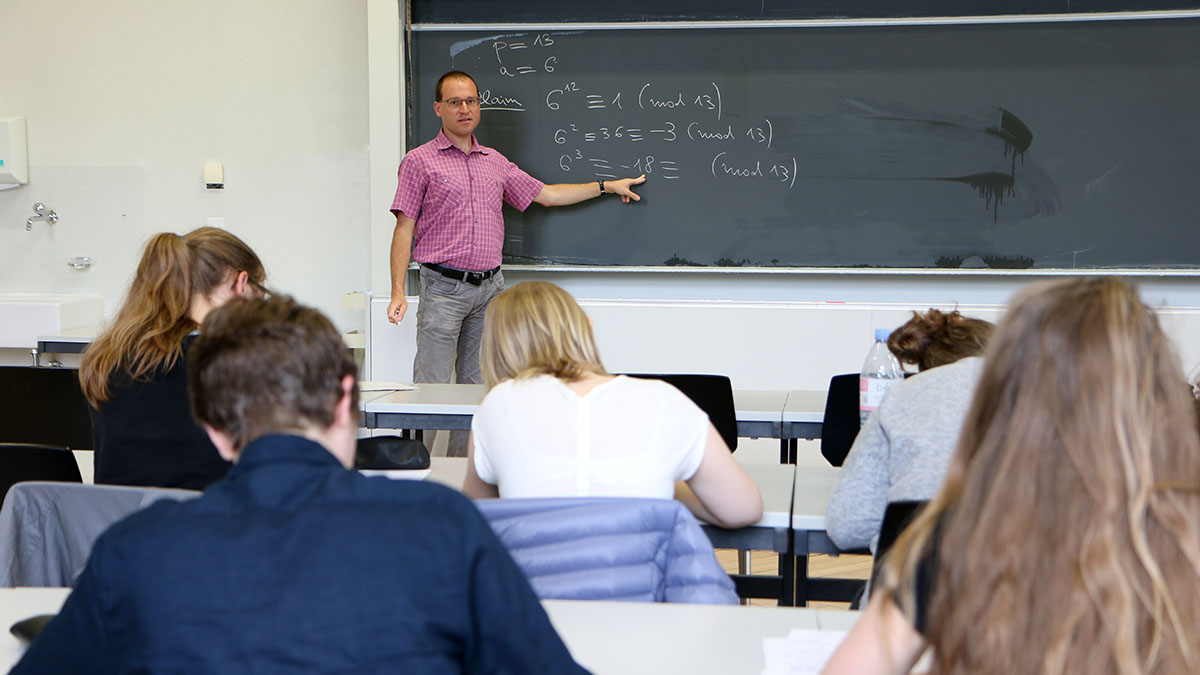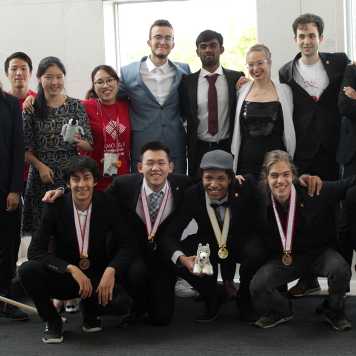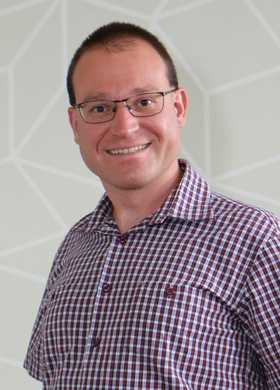"My passion for problem solving skyrocketed"
Although the level of mathematics education at Swiss secondary schools is very high, it offers top students too few opportunities to deepen their interest in this subject. The ETH Math Youth Academy meets this need with its flexible and multi-level system. In the following interview, Dr Kaloyan Slavov, Director of the Academy, explains how he teaches students mathematical thinking and introduces them step by step to complex mathematical topics.
Since the launch of the ETH Math Youth Academy, the number of participants has grown continuously. The programme seems to address the needs of the students very well. Can you briefly summarise the main principles and goals of the Academy?
The main goal of the Academy is to allow students to explore their potential and go beyond the regular curriculum – we call this extracurricular mathematics. We cover topics that are not part of the regular school curriculum and are not covered at university either. So the students have a unique chance to get in touch with mathematics that they would otherwise miss, and they appreciate this opportunity.
“I decided to visit once out of curiosity. It immediately sparked my interest, and during the year and a half I participated, my passion for problem solving skyrocketed.”Tamara
The ETH Math Youth Academy is a long-term programme in which students can participate throughout the year. They start from scratch and slowly build up more and more knowledge. How is the programme set up?
I have developed a special curriculum that allows students to participate in the Academy over several years: In the first year, students take the introductory course, where I select topics that are appropriate for students who have not yet done extracurricular mathematics. Then, in the second year, students can stay in the introductory course, move to the intermediate course or take both. The same happens in the third year: they can stay in the intermediate course or go to the advanced course or do both.
Everyone can take as much from the programme as they want. I have some students who are in all three levels. Some students go to the advanced level even though it is a bit too difficult for them, but they do their best and still learn something. Or maybe the introductory level is too easy for some students, but they just take it to make sure they have a solid foundation before taking a more advanced course. This is why I have called the programme "Academy".

Some of the students commute for hours by train to attend the Academy. The interest of the students in the way mathematics is done there must be extremely high. Can you say something about how this comes about?
The programme is designed to allow the students to grow. The topics get more difficult over time, but the increments are so small that they don't even notice them. Some students attend just out of curiosity to see what their friends are doing here every week. They come and like it so much that they say, "Wow, this is so interesting, so exciting! I'll come back next week." And then they just keep coming back. Some attend the academy for one or two years, while others stay for several years and reach such a high level that they win medals in international competitions like the Mathematics Olympiads.
“I’m more passionate about math than ever, mainly due to the curiosity that was kept alive at the academy.”Tamara
Is one of the objectives of the Academy to prepare the students for the Olympiads?
Preparing for the Olympiads is part of what we do, and sometimes a number of our students take part in international competitions as members of the Swiss team. Mathys Douma, for example, has won a gold medal at the 2023 International Mathematics Olympiad. This is the second gold medal for Switzerland since 1991.
And then there is the European Girls' Mathematical Olympiad, known as EGMO, in which Switzerland took part with four participants, two of them were students at the Academy.
ETH Math Youth Academy students win medals at Mathematical Olympiad

The Swiss team won four medals at the IMO that took place from 2 to 13 July 2023 in Japan. Three of the winners attended the ETH Math Youth Academy. Read more
Is the Academy a preparatory course for university studies? If so, what do the participants learn at the Academy that prepares them for studying mathematics or other subjects at ETH Zurich?
The programme is not a preparatory course for prospective ETH students. But it is of course obvious that many of our students enrol to study mathematics at ETH because they can start with a very good momentum thanks to the Academy. They are better prepared and can benefit from their knowledge and problem-solving skills in their first and second year at ETH. But even if they don’t study math, they have practised analytical and creative thinking, learned to write proofs and think outside the box.
Say you read a philosophy book in a foreign language, maybe French. If your French is not perfect, you will struggle with trying to understand what the individual words mean. But if you are fluent in French, your focus while reading the text is on the deeper content and the actual philosophy. In that way, when our students attend ETH later, they will get a lot more out of it.
“The once daunting and scary complexity of advanced mathematics doesn’t intimidate me anymore, and I can confidently tackle the hardest problems head on now.”Eric
You mention the social aspects of the Academy and that it is important for students to belong to a group of like-minded people. Can you explain this in more detail?
At the Academy, our students meet like-minded people with whom they can share their interests and learn to work together on difficult problems. Sometimes a solution requires input and ideas from several students. They learn to build on each other's ideas and to spend hours together working on a problem. Thanks to the Academy, friendships are formed that may last a lifetime.
“It is a great investment for the future, but also because it is an extremely fun and engaging experience that will never be forgotten. ”Toby
About the Academy
The ETH Math Youth Academy was established in 2015 and was initially funded by National Centre of Competence in Research – SwissMAP. Since autumn semester 2023, the Academy has been established on a permanent basis at ETH Zurich and is now funded by the Department of Mathematics, the FIM – Institute for Mathematical Research and the Bernoulli Centre at EPFL.

Kaloyan Slavov earned his Bachelor's in mathematics from Harvard University in 2007 and continued his education at the University of Cambridge, where he received a CAS in mathematics in 2008. He completed his doctoral degree at the Massachusetts Institute of Technology in 2011 and then took up a position as Assistant Professor at the American University in Bulgaria. Since 2015, Slavov has been Director of the ETH Math Youth Academy.